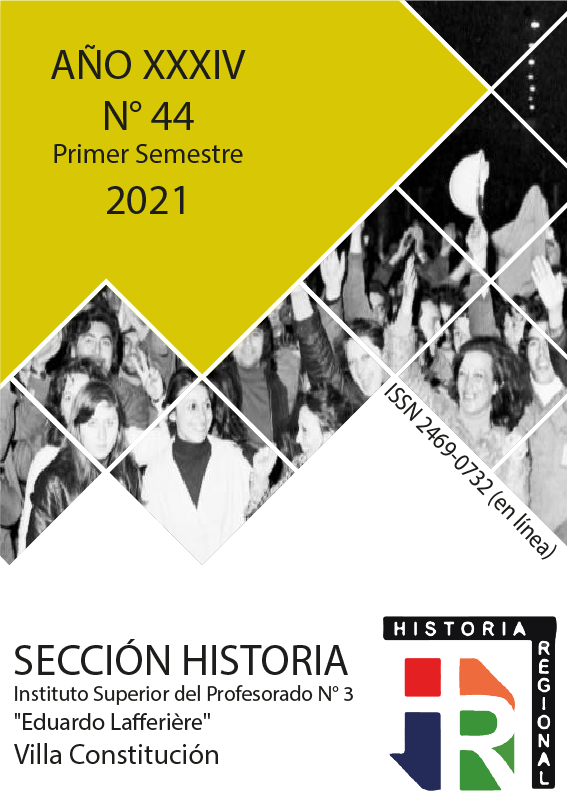Rethinking the history of the labor movement in a local key in the school classroom: Rosario from the late 19th century to the Saenz Peña Law
Main Article Content
Abstract
In this article we propose an approach to the history of the Argentine workers' movement from a local perspective, particularly that of Rosario between its origins and 1912. The proposal seeks to problematize the importance of the approach to local history in secondary education, emphasizing the expansion of the space devoted to the study of the workers' movement, which is usually very scarce in school textbooks, as well as in the curriculum. On the other hand, we seek to rethink the time frames and categories that are usually used to think about history at the school level, which is usually done from the experience of Buenos Aires, projecting it on the rest of the country as equivalent to all regional realities. In this way, we propose to deepen the local dimension of this approach in order to strengthen the situated knowledge that brings students closer to their local realities, while they can understand the common matrices, but also the differences with the national narratives.
Downloads
Download data is not yet available.
Article Details
How to Cite
Álvarez, C. (2021). Rethinking the history of the labor movement in a local key in the school classroom: Rosario from the late 19th century to the Saenz Peña Law. Historia Regional, (44), 1-12. Retrieved from https://historiaregional.org/ojs/index.php/historiaregional/article/view/468
Section
Teaching materials

This work is licensed under a Creative Commons Attribution 4.0 International License.
Los autores que publican en esta revista están de acuerdo con los siguientes términos:
- Los autores conservan los derechos de autor y garantizan a la revista el derecho de ser la primera publicación del trabajo al igual que licenciado bajo una Creative Commons Attribution License que permite a otros compartir el trabajo con un reconocimiento de la autoría del trabajo y la publicación inicial en esta revista.
- Los autores pueden establecer por separado acuerdos adicionales para la distribución no exclusiva de la versión de la obra publicada en la revista (por ejemplo, situarlo en un repositorio institucional o publicarlo en un libro), con un reconocimiento de su publicación inicial en esta revista.
- Se permite y se anima a los autores a difundir sus trabajos electrónicamente (por ejemplo, en repositorios institucionales o en su propio sitio web) antes y durante el proceso de envío, ya que puede dar lugar a intercambios productivos, así como a una citación más temprana y mayor de los trabajos publicados (Véase The Effect of Open Access) (en inglés).
References
Anderson, P. (1980). El Estado Absolutista. Buenos Aires: Siglo XXI Editores.
Falcón, R. (2005). La Barcelona Argentina: migrantes, obreros y militantes en Rosario 1870-1912. Rosario: Laborde Editor.
López, N. (2020). La modernización de la policía de Rosario a principios del siglo XX. La División de Investigaciones (1906-1907). Historia Regional, Año XXXIII, N° 42, Rosario. Recuperado en: http://historiaregional.org/ojs/index.php/historiaregional/article/view/391/712
Monserrat, A. (1993). El anarquismo rosarino y la cuestión de la organización (1890-1910). En: A. Ascolani (Comp.). Historia del sur santafesino: la sociedad transformada (1850-1930). Rosario: Ediciones Platino.
Prieto, A. (2020). La “huelga grande” de 1896 en la emergencia de la cuestión obrera rosarina. Revista Archivos, (17), 143-162, 2020. Recuperado en: https://www.archivosrevista.com.ar/numeros/index.php/archivos/article/view/282
Prieto, A. (2000). Rosario: 1904. Cuestión social, política y multitudes obreras. Estudios Sociales, Año X, N° 19, Santa Fe. Recuperado en:
https://dialnet.unirioja.es/descarga/articulo/7624076.pdf
Prieto, A. (2001). Los trabajadores. En: R. Falcón y M. Stanley (dirs.), La Historia de Rosario: economía y sociedad. Capítulo 3. Rosario: Homo Sapiens.
Suriano, J. (2001). La cuestión social y el complejo proceso de construcción inicial de las políticas sociales en Argentina. Ciclos, Año XI, Vol. XI, N° 21, 1er semestre: 121. Recuperado en: http://bibliotecadigital-old.econ.uba.ar/download/ciclos/ciclos_v11_n21_05.pdf
Falcón, R. (2005). La Barcelona Argentina: migrantes, obreros y militantes en Rosario 1870-1912. Rosario: Laborde Editor.
López, N. (2020). La modernización de la policía de Rosario a principios del siglo XX. La División de Investigaciones (1906-1907). Historia Regional, Año XXXIII, N° 42, Rosario. Recuperado en: http://historiaregional.org/ojs/index.php/historiaregional/article/view/391/712
Monserrat, A. (1993). El anarquismo rosarino y la cuestión de la organización (1890-1910). En: A. Ascolani (Comp.). Historia del sur santafesino: la sociedad transformada (1850-1930). Rosario: Ediciones Platino.
Prieto, A. (2020). La “huelga grande” de 1896 en la emergencia de la cuestión obrera rosarina. Revista Archivos, (17), 143-162, 2020. Recuperado en: https://www.archivosrevista.com.ar/numeros/index.php/archivos/article/view/282
Prieto, A. (2000). Rosario: 1904. Cuestión social, política y multitudes obreras. Estudios Sociales, Año X, N° 19, Santa Fe. Recuperado en:
https://dialnet.unirioja.es/descarga/articulo/7624076.pdf
Prieto, A. (2001). Los trabajadores. En: R. Falcón y M. Stanley (dirs.), La Historia de Rosario: economía y sociedad. Capítulo 3. Rosario: Homo Sapiens.
Suriano, J. (2001). La cuestión social y el complejo proceso de construcción inicial de las políticas sociales en Argentina. Ciclos, Año XI, Vol. XI, N° 21, 1er semestre: 121. Recuperado en: http://bibliotecadigital-old.econ.uba.ar/download/ciclos/ciclos_v11_n21_05.pdf

